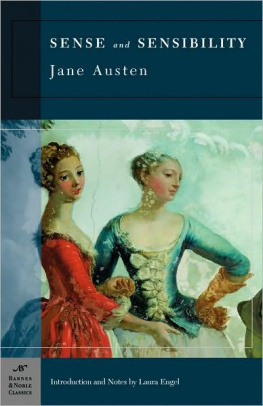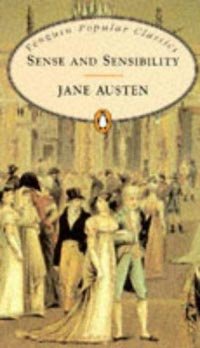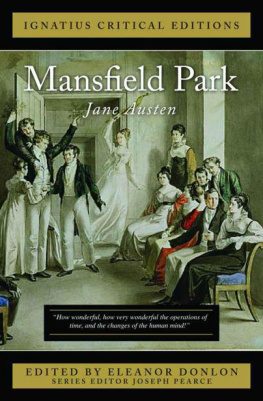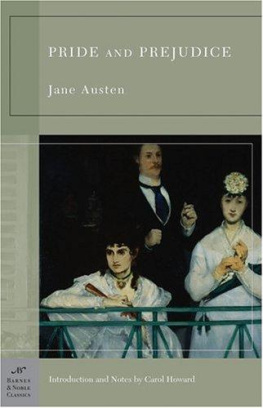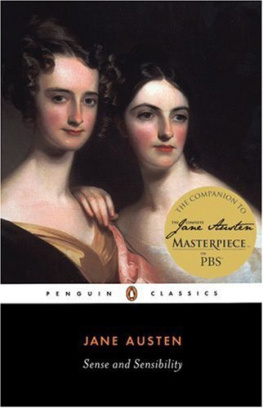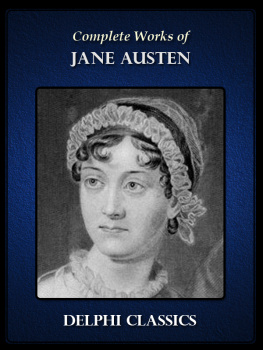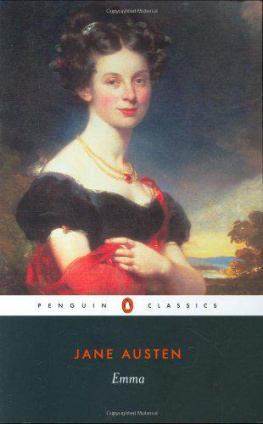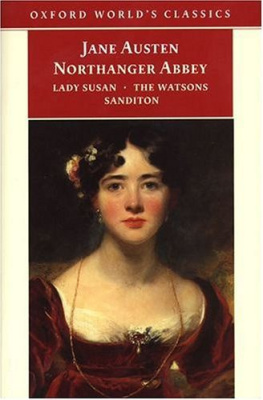
Table of Contents
From the Pages of Sense and Sensibility
The more I know of the world the more am I convinced that I shall never see a man whom I can really love. I require so much! (page 15)
That is what I like; that is what a young man ought to be. Whatever be his pursuits, his eagerness in them should know no moderation, and leave him no sense of fatigue. (page 38)
There is something so amiable in the prejudices of a young mind, that one is sorry to see them give way to the reception of more general opinions. (page 47)
Seven years would be insufficient to make some people acquainted with each other, and seven days are more than enough for others. (page 49)
I have no wish to be distinguished; and I have every reason to hope I never shall. Thank Heaven! I cannot be forced into genius and eloquence. (page 75)
At my time of life opinions are tolerably fixed. It is not likely that I should now see or hear any thing to change them.
(page 77)
You are in a melancholy humour, and fancy that any one unlike yourself must be happy. But remember that the pain of parting from friends will be felt by every body at times, whatever be their education or state. Know your own happiness. You want nothing but patienceor give it a more fascinating name, call it hope. (page 85)
He is such a charming man, that it is quite a pity he should be so grave and so dull. (page 96)
A man who has nothing to do with his own time has no conscience in his intrusion on that of others. (page 166)
There was a kind of cold-hearted selfishness on both sides, which mutually attracted them; and they sympathised with each other in an insipid propriety of demeanour, and a general want of understanding. (page 188)
Because they neither flattered herself nor her children, she could not believe them good-natured; and because they were fond of reading, she fancied them satirical: perhaps without exactly knowing what it was to be satirical. (page 201 )
Elinor agreed to it all, for she did not think he deserved the compliment of rational opposition. (page 206)
She said little, but every sentence aimed at cheerfulness; and though a sigh sometimes escaped her, it never passed away without the atonement of a smile. (page 281)


Published by Barnes & Noble Books
122 Fifth Avenue
New York, NY 10011
www.barnesandnoble.com/classics
Sense and Sensibility was first published in 1811.
Published in 2004 by Barnes & Noble Classics with new Introduction,
Notes, Biography, Chronology, Inspired By, Comments & Questions,
and For Further Reading.
Introduction, Notes, and For Further Reading
Copyright @ 2003 by Laura Engel.
Note on Jane Austen, The World of Jane Austen and Sense and Sensibility,
Inspired by Sense and Sensibility, and Comments & Questions
Copyright 2004 by Barnes & Noble, Inc.
All rights reserved. No part of this publication may be reproduced or
transmitted in any form or by any means, electronic or mechanical,
including photocopy, recording, or any information storage and
retrieval system, without the prior written permission of the publisher.
Barnes & Noble Classics and the Barnes & Noble Classics colophon are
trademarks of Barnes & Noble, Inc.
Sense and Sensibility
ISBN-13: 978-1-59308-125-6 ISBN-10: 1-59308-125-1
eISBN : 978-1-411-43314-4
LC Control Number 2004101427
Produced and published in conjunction with:
Fine Creative Media, Inc.
322 Eighth Avenue
New York, NY 10001
Michael J. Fine, President and Publisher
Printed in the United States of America
QM
7 9 10 8
Jane Austen

The English novelist Jane Austen was born December 16, 1775, the seventh of eight children, in the Parsonage House of Steventon, Hampshire, where she spent her first twenty-five years. During her brief lifetime Austen witnessed political unrest, revolution, war, and industrialization, yet these momentous events are not the central subjects of her finely focused novels. Rather, Austen wrote of her immediate experience: the microcosm of the country gentry and its class-conscious insularity. Janes father, the Reverend George Austen, was the erudite country rector of Steventon, and her mother, Cassandra (ne Leigh), was descended from an aristocratic line of learned clergymen. By no means wealthy, the Austens nonetheless enjoyed a comfortable, socially respectable life, and greatly prized their childrens education.
Jane and her beloved elder (and only) sister, Cassandra, were schooled in Southampton and Reading for a short period, but most of their education took place at home. Private theatrical performances in the barn at Steventon complemented Janes studies of French, Italian, history, music, and eighteenth-century fiction. An avid reader from earliest childhood, Jane began writing at age twelve, no doubt encouraged by her cultured and affectionate family. Indeed, family and writing were her great loves; despite a fleeting engagement in 1802, Austen never married. Her first two novels, Elinor and Marianne and First Impressions, were written while at Steventon but never published in their original form.
Following her fathers retirement, Jane moved in 1801 with her parents and sister to Bath. That popular watering hole, removed from the country life Jane preferred, presented the sociable young novelist with a wealth of observations and experience that would later emerge in her novels. Austen moved to Southampton with her mother and sister after the death of her father in 1805. Several years later the three women settled in Chawton Cottage in Hampshire, where Austen resided until the end of her life. She relished her return to the countryside and, with it, a renewed artistic vigor that led to the revision of her early novels. Sense and Sensibility, a reworking of Elinor and Marianne, was published in 1811, followed by Pride and Prejudice, a reworking of First Impressions, two years later.
Austen completed four more novels (Mansfield Park, Emma, Northanger Abbey, and Persuasion) in the Chawton sitting room. Productive and discreet, she insisted that her work be kept secret from anyone outside the family. All of her novels were published anonymously, including the posthumous release, thanks to her brother Henry, of Northanger Abbey and Persuasion.
The last years of Austens life were relatively quiet and comfortable. Her final, unfinished work, Sanditon, was put aside in the spring of 1817, when her health sharply declined and she was taken to Winchester for medical treatment of what appears to have been Addisons disease or a form of lymphoma. Jane Austen died there on July 18, 1817, and is buried in Winchester Cathedral.
The World of Jane Austen and Sense and Sensibility

|
| 1775 | The American Revolution begins in April. Jane Austen is born on December 16 in the Parsonage House in Stev enton, Hampshire, England, the seventh of eight chil dren (two girls and six boys). |
Next page
